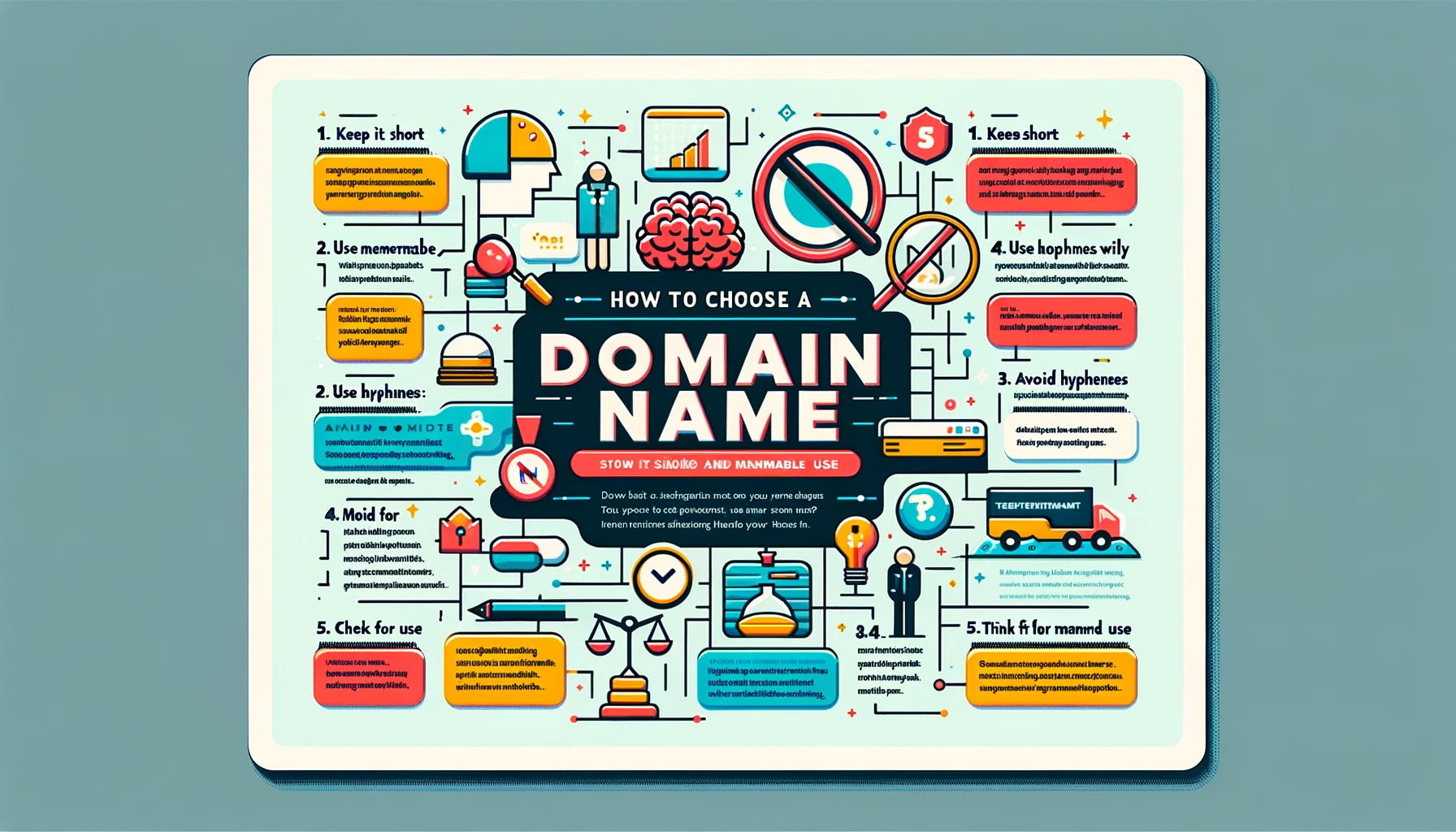
Choosing the right domain name is pivotal for establishing a strong online presence, branding, and SEO effectiveness.
A domain name serves as the digital identity for a business or individual, acting as the primary gateway through which users discover and interact with websites.
It's the first impression that potential visitors have, and a well-chosen domain name can significantly impact user perception and recall.
From an SEO perspective, a domain name can influence search engine rankings, especially when it includes relevant keywords.
Hence, should we invest time and effort in How to Choose a Domain Name? Is good for your business.
Understanding Different Types Of Domain Names
There are three types: brandable, keyword-rich, and exact match domains.
⒈Brandable Domains
These are unique, creative, and often invented names, like "Google" or "Amazon." Their main advantage lies in their distinctiveness, making them highly memorable and easily brandable.
Brandable domains foster strong brand identity and are less likely to clash with existing trademarks.
However, they may require more marketing effort and SEO to build brand recognition, as they don't inherently convey what the business is about.
⒉Keyword-rich Domains
These domains incorporate keywords related to the business or industry, like "FastFoodDelivery.com."
They can be advantageous for SEO as they are descriptive and self-explanatory, potentially enhancing search engine rankings for those keywords.
However, they can be less unique and may face more competition in domain availability. There's also a risk of appearing generic, which can impact brand perception.
⒊Exact Match Domains (EMDs)
EMDs are domain names that exactly match a highly searched keyword or phrase, such as "BuyBooksOnline.com."
They can have a significant SEO advantage, especially for niche markets, as they align precisely with common search queries.
The Role Of Domain Extensions In Branding And SEO
Top-level domains (TLDs) play a significant role in branding and SEO. The choice of a domain extension can affect user perception and search engine rankings, though somewhat in the latter case.
➞ .com
This is the most recognized and trusted TLD. It's ideal for commercial businesses and is often the first choice for online ventures. A .com extension benefits global recognition and is often assumed by default when users remember a website.
However, due to its popularity, finding a short and relevant domain can take time and effort.
➞.org:
Typically associated with non-profit organizations, educational platforms, and community projects.
Using a .org can add trust and integrity to a brand, especially for charitable or informational sites. It could be better for commercial entities as it might mislead the audience about the nature of the business.
➞.net:
Initially intended for network-oriented entities like internet service providers, this TLD is now a popular alternative to .com. It's versatile but less memorable compared to .com.
For businesses where .com is taken, a.net is a suitable alternative. However, it may risk losing some traffic to the .com version.
➞ Niche TLDs (like .tech, .photography, .blog):
These newer TLDs offer a great way to express a brand's nature and focus directly on the domain name. They can be beneficial for standing out and directly targeting a specific audience or industry.
However, they are less universally recognized and may be more challenging for SEO as they are newer and less traditional.
Country Code TLDs (like .uk, .ca, .au): These are excellent for businesses targeting a local market, as they can help in local search rankings and signal to users that the content is region-specific.
Tips For Creating A Memorable And Effective Domain Name
Keep it Short and Simple: Aim for brevity to enhance memorability. Ideally, keep it under 15 characters. Long or complex names increase the risk of typos and are harder to remember.
Easy to Pronounce and Spell: Ensure your domain name can be easily spoken and understood over the phone. Avoid complex words, unusual spellings, or anything easily misinterpreted when spoken. This enhances word-of-mouth marketing and reduces errors when typing the domain.
Avoid Hyphens and Numbers: Hyphens and numbers can confuse. For instance, people might mix up numerical digits with their word forms (5 vs. five) or need to remember to include hyphens. Stick to letters to keep your domain unambiguous.
Use Relevant Keywords: Incorporate keywords that describe your business and its services. This not only aids in SEO but also helps potential visitors understand what your site is about. However, balance is key; keep keywords and keep the domain manageable.
Be Unique and Brandable: Your domain name should stand out. Avoid generic terms and consider a name that resonates with your brand's personality. Unique and creative names are more likely to stick in someone's memory.
Consider Your Brand's Scope: Choose a name that reflects your business but leaves room for growth. For example, if your business might expand beyond just "coffee" to other beverages or food items, a name like "MorningDelights" might be more adaptable than "Best Coffee Shop."
The Do's And Don'ts Of Domain Name Selection
Do's
- Do Make It Memorable: Your domain should be catchy and memorable. Unique names are more likely to stick in a person's memory, enhancing brand recall.
- Do Ensure Simplicity: Choose a name that is easy to spell and pronounce. Avoid complex words or spellings that could lead to misunderstandings or errors when typing the URL.
- Do Include Relevant Keywords: Include keywords describing your business and its services. This can improve SEO and make it clear what your site offers.
- Do Conduct Research: Check the availability of your chosen domain and ensure it's not trademarked or used in a way that could create confusion or legal issues.
Don'ts
- Don't Use Hyphens or Numbers: Avoid hyphens and numbers in your domain name. They must often be remembered or misinterpreted (e.g., numerical vs. spelled out).
- Don't Make It Overly Specific: While relevancy is key, too specific a domain might limit your business's ability to diversify or expand.
- Don't Copy or Mimic Popular Brands: Avoid domain names that are too similar to well-known brands. This could lead to legal issues and confusion among your audience.
- Don't Ignore Local Considerations: If your business is local, consider including a local element in your domain name. However, if you plan to expand globally, ensure the name has a broader appeal.
Checking Domain Name Availability And Legal Considerations
⒈Check Domain Availability
Use Domain Registrar Websites: Websites like GoDaddy, Namecheap, or Bluehost offer domain search tools.
Consider Different Extensions: If your preferred .com domain is taken, explore other TLDs like .net, .org, or niche extensions (.tech, .blog, etc.).
Domain Name Generators: Tools like Nameboy or Wordoid can help generate available domain names based on your keywords if your initial choice is taken.
⒉Legal Considerations
Trademark Search: Conduct a trademark search before finalizing a domain name to ensure it's not already trademarked. In the U.S., you can use(USPTO). Other countries have similar databases.
Avoid Infringement: Accidentally choosing a domain similar to a trademarked name can lead to legal disputes and potentially costly consequences. Be cautious, especially with names resembling well-known brands.
Consistent Branding: Ensure the domain name aligns with your existing business names or trademarks to maintain consistent branding and avoid confusion.
Register Trademarks: Consider trademarking your domain name if it's unique to your brand, adding a layer of legal protection.
Utilizing Domain Name Generators And Tools
Here are some useful options:
- Nameboy: Find available domain names based on your input keywords. It offers a range of suggestions, including hybrid words and alternative TLDs.
- Wordoid: This creative tool generates made-up words that sound natural. It's particularly useful for finding brandable domain names. To refine your search, you can set parameters such as language, quality, pattern, and length.
- Lean Domain Search: This tool, by Automattic (the company behind WordPress.com), pairs your keyword with other words to produce a wide range of available domain names. It's particularly useful for finding keyword-rich domain names.
- BustAName: BustAName allows you to input multiple keywords, mixing and matching these words to create available domain names. It also lets you apply filters such as word order and extensions for a more targeted search.
- Shopify's Business Name Generator: While designed for businesses, this tool can also help in domain name brainstorming. It generates business names and checks for domain availability at the same time.
- Domain Wheel: This tool suggests straightforward domain names based on your keywords and provides creative, somewhat random ideas, which can be excellent for brandable domain names.
FAQs
Why Is A .com Domain Often Recommended Over Others?
.com domains are trusted and easy to remember.
Can A Domain Name Affect SEO?
While a domain name has limited direct impact on SEO, having relevant keywords in the domain can enhance search engine understanding and user perception of site relevance.
Is It Legally Necessary To Avoid Domain Names Similar To Existing Trademarks?
It's crucial to ensure your domain name doesn't infringe on existing trademarks to avoid legal disputes and potential infringement issues.
How Can Domain Name Generators Assist In Choosing A Domain Name?
Domain name generators suggest available names based on your input keywords, helping you quickly find creative, relevant, and available options.
What Are The Drawbacks Of Using Hyphens And Numbers In Domain Names?
Hyphens and numbers can lead to confusion, are often forgotten or mistyped, and make the domain name appear cluttered or less credible.
Should A Domain Name Always Match The Business Name?
While matching the business name can enhance brand consistency, creative or web-friendly adaptations can be effective, especially if the business name isn't available or adaptable for online platforms.
Final Words
Consider the domain type—brandable, keyword-rich, or an exact match domain—based on your business goals and SEO strategy. Choosing a domain extension (.com, .org, .net, etc.) also influences branding and audience perception.
Avoid common pitfalls such as hyphens, numbers, or overly specific terms limiting future growth. Utilize domain name generators and conduct thorough research to ensure availability and avoid legal issues.
